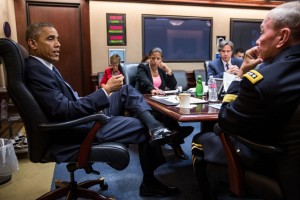This piece was reprinted by OpEd News with permission or license. It may not be reproduced in any form without permission or license from the source.
Cross-posted from Consortium News
Before dawn broke in Washington on Saturday, "Ukrainian pro-Russian separatists" -- more accurately described as federalists of southeast Ukraine who oppose last February's coup in Kiev -- unloaded desperately needed provisions from some 280 Russian trucks in Luhansk, Ukraine. The West accused those trucks of "invading" Ukraine on Friday, but it was a record short invasion; after delivering their loads of humanitarian supplies, many of the trucks promptly returned to Russia.
I happen to know what a Russian invasion looks like, and this isn't it. Forty-six years ago, I was 10 miles from the border of Czechoslovakia when Russian tanks stormed in to crush the "Prague Spring" experiment in democracy. The attack was brutal.
I was not near the frontier between Russia and southeastern Ukraine on Friday as the convoy of some 280 Russian supply trucks started rolling across the border heading toward the federalist-held city of Luhansk, but that "invasion" struck me as more like an attempt to break a siege, a brutal method of warfare that indiscriminately targets all, including civilians, violating the principle of non-combatant immunity.
Michael Walzer, in his War Against Civilians, notes that "more people died in the 900-day siege of Leningrad during WWII than in the infernos of Hamburg, Dresden, Tokyo, Hiroshima and Nagasaki taken together." So the Russians have some strong feelings about sieges.
There's also a personal side for Russian President Vladimir Putin, who was born in Leningrad, now Saint Petersburg, eight years after the long siege by the German army ended. It is no doubt a potent part of his consciousness. One elder brother, Viktor, died of diphtheria during the siege of Leningrad.
The Siege of Luhansk
Despite the fury expressed by U.S. and NATO officials about Russia's unilateral delivery of the supplies after weeks of frustrating negotiations with Ukrainian authorities, there was clearly a humanitarian need. An International Committee of the Red Cross (ICRC) team that visited Luhansk on Aug. 21 to make arrangements for the delivery of aid found water and electricity supplies cut off because of damage to essential infrastructure.
The Ukrainian army has been directing artillery fire into the city in an effort to dislodge the ethnic Russian federalists, many of whom had supported elected President Viktor Yanukovych who was ousted in the Feb. 22 coup.
The Red Cross team reported that people in Luhansk do not leave their homes for fear of being caught in the middle of ongoing fighting, with intermittent shelling into residential areas placing civilians at risk. Laurent Corbaz, ICRC head of operations for Europe and Central Asia, reported "an urgent need for essentials like food and medical supplies."
The ICRC stated that it had "taken all necessary administrative and preparatory steps for the passage of the Russian convoy," and that, "pending customs checks," the organization was "therefore ready to deliver the aid to Luhansk ... provided assurances of safe passage are respected."
The "safe passage" requirement, however, was the Catch-22. The Kiev regime and its Western supporters have resisted a ceasefire or a political settlement until the federalists -- deemed "terrorists" by Kiev -- lay down their arms and surrender.
Accusing the West of repeatedly blocking a "humanitarian armistice," a Russian Foreign Ministry statement cited both Kiev's obstructionist diplomacy and "much more intensive bombardment of Luhansk" on Aug. 21, the day after some progress had been made on the ground regarding customs clearance and border control procedures: "In other words, the Ukrainian authorities are bombing the destination [Luhansk] and are using this as a pretext to stop the delivery of humanitarian relief aid."
"Decision to Act"
Referring to these "intolerable" delays and "endless artificial demands and pretexts," the Foreign Ministry said, "The Russian side has decided to act." And there the statement's abused, plaintive tone ended sharply -- with this implied military threat:
"We are warning against any attempts to thwart this purely humanitarian mission. ... Those who are ready to continue sacrificing human lives to their own ambitions and geopolitical designs and are rudely trampling on the norms and principles of international humanitarian law will assume complete responsibility for the possible consequences of provocations against the humanitarian relief convoy."
Despite all the agreements and understandings that Moscow claims were reached earlier with Ukrainian authorities, Kiev insists it did not give permission for the Russian convoy to cross its border and that the Russians simply violated Ukrainian sovereignty -- no matter the exigent circumstances they adduce.
(Note: You can view every article as one long page if you sign up as an Advocate Member, or higher).






